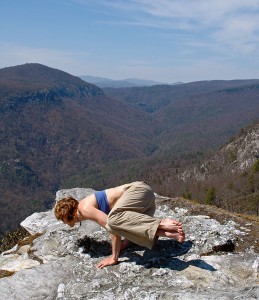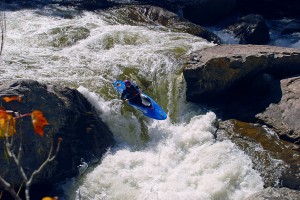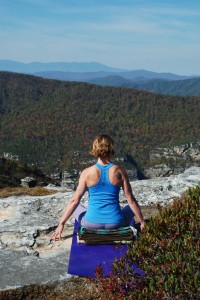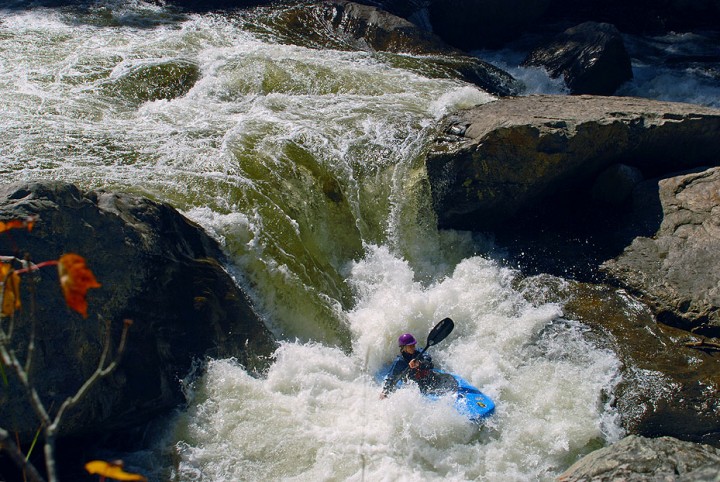Balancing Game: Yoga Therapy
Back in 2001, I was an overly eager intermediate kayaker. At the same time, I was pushing myself in yoga by doing poses that were beyond my ability. The result? I flipped on a river that I had no business paddling and dislocated my shoulder. I was devastated.
My mom is a physical therapist, so I knew I needed to rest my shoulder. With her help, I did the right things and made a full recovery. All I wanted to do was get back on the river.
 During my recovery, I took a deeper look at myself and my paddling while reading The Squirt Book by Jim Snyder. I returned to the sport completely healed and more aware of both my paddling techniques and my motivations. I did well for a few months, then I flipped on a creek and my shoulder subluxed. The fact that it only subluxed was a good sign – it meant that I’d healed well from the last injury. But it was clear that my mindset and paddling techniques still weren’t ready for the kind of whitewater I was pushing myself to paddle. It took time and self-inquiry to learn to be happy with where I am day-by-day in my paddling while still progressing toward my paddling goals. It’s a balancing game.
During my recovery, I took a deeper look at myself and my paddling while reading The Squirt Book by Jim Snyder. I returned to the sport completely healed and more aware of both my paddling techniques and my motivations. I did well for a few months, then I flipped on a creek and my shoulder subluxed. The fact that it only subluxed was a good sign – it meant that I’d healed well from the last injury. But it was clear that my mindset and paddling techniques still weren’t ready for the kind of whitewater I was pushing myself to paddle. It took time and self-inquiry to learn to be happy with where I am day-by-day in my paddling while still progressing toward my paddling goals. It’s a balancing game.
The injuries took a toll on my shoulder. I developed chronic pain from impingement syndrome (sometimes called swimmer’s shoulder or thrower’s shoulder). Looking for relief, I began studying yoga therapy and playing around with different yoga techniques. To my amazement, pain that I’d had in my shoulder for seven years went away in about two weeks. As the pain faded, I gained a safe range of motion that I’d never thought possible. My strength increased too. Now I can do all kinds of things that I’d been told I would never do again without surgery. Thanks to yoga therapy for my body and mind, both my paddling and yoga practice are thriving. My athletic life is opening up to new possibilities every day.
 The yoga technique I apply to my paddling is called self-reflection: “Through sustained focus and meditation on our patterns, habits, and conditioning, we gain knowledge and understanding of our past and of how we can change the patterns that aren’t serving us to live more fully.” We can help ourselves heal by looking at the habits, whether physical or mental, that have caused or contributed to our injuries. Such habits may include attitudes, paddling technique and training methods. Being injured allows us time to do some self reflection, to look deeply at ourselves both mentally and physically, so we can return to action even better than we were before.
The yoga technique I apply to my paddling is called self-reflection: “Through sustained focus and meditation on our patterns, habits, and conditioning, we gain knowledge and understanding of our past and of how we can change the patterns that aren’t serving us to live more fully.” We can help ourselves heal by looking at the habits, whether physical or mental, that have caused or contributed to our injuries. Such habits may include attitudes, paddling technique and training methods. Being injured allows us time to do some self reflection, to look deeply at ourselves both mentally and physically, so we can return to action even better than we were before.
The first and most difficult aspect of yourself to look at is your mental attitude. Oftentimes you’ll meet resistance, making it difficult to see the problem right away. When you’re injured, ask yourself how it happened. Were you pushing yourself too hard on the water or while training? If so, why? Did you want so badly to be a Class V creeker or great playboater that you started cutting corners? Were you so focused on doing well in a competition that you over trained? Were you running things you weren’t qualified to run? Were you scared out of your mind and consequently doing all the wrong things in a rapid? Were you pressured to run something you knew you shouldn’t? Were you too cold? Were you tired from not sleeping well, or from partying too hard, or from too many days of paddling and other activites?
The point is not to judge and berate yourself. It’s not even that these things are “wrong.” After all, you’ll never progress if you don’t push yourself. The point is to get to the bottom of what is driving you and see what attitudes and actions might actually be holding you back. We’re all human. We all want to succeed, to be noticed and praised, and to paddle as much as we can; but without any temperance, our human tendencies can lead to injuries, and worse.
Take time after your injury to look at yourself and what’s driving you. Analyze it, understand it, and then make the changes you need to make. If you want to be a great kayaker, surround yourself with great kayakers and listen to their guidance. If you want to be a racer, ask more experienced racers for training advice. Water is a complex medium that takes a lifetime to figure out, and it’s a medium that will have no mercy on you if you rush it. Slow down and just listen – to yourself, to boating mentors, to the river.
 Keep in mind that the wrong attitudes can negatively affect your rehabilitation exercises too! Are you rushing or being too forceful? Are you so amped to heal that you’re doing too many exercises too often? (I’m guilty of that one!) Or have you been lazy in your recovery, thinking you don’t need to train, that you can just go right back to paddling at pre-injury levels? Such lines of thinking usually end you up right back on the couch. If you really want to get back into paddling after an injury, you need to be diligent, intelligent and consistent with your training. If you don’t know how to rehabilitate your injury, seek professional help instead of chat boards.
Keep in mind that the wrong attitudes can negatively affect your rehabilitation exercises too! Are you rushing or being too forceful? Are you so amped to heal that you’re doing too many exercises too often? (I’m guilty of that one!) Or have you been lazy in your recovery, thinking you don’t need to train, that you can just go right back to paddling at pre-injury levels? Such lines of thinking usually end you up right back on the couch. If you really want to get back into paddling after an injury, you need to be diligent, intelligent and consistent with your training. If you don’t know how to rehabilitate your injury, seek professional help instead of chat boards.
Along with examining your mind and mental state, recovering from injury requires you to pay close attention to your body. Study how you move in recovery exercises, your daily training and your paddling. No amount of recovery exercises will help you if you don’t learn to move your body more effectively. Applying mindfulness to your exercises will help you discover how you move and how to move better. You gain very little from mindless exercise, but if you apply your mind, you’ll be blown away.
Apply mindfulness to your exercises by moving very , very slowly while paying extra-close attention to every sensation in your body. Less is more – I promise. If you push through pain, you will never escape pain. So stay within in a pain-free range of motion, no matter how small. Don’t push through any wobbliness, or weird pops or cracks, either.
If an exercise or stretch doesn’t feel right, then it probably isn’t. Don’t do an exercise just because someone suggested it. Do the exercises that make your injury feel less painful and more stable. You’ll be amazed at how your body responds.
While exercising, don’t focus entirely on the injured area. What is your spine doing? Your hips? Your shoulder girdle? Are you torquing your spine anywhere? Are you raising one hip? Are you tensing your shoulders? Are you tensing your jaws or eyebrows? Each of these compensations is wasted energy and will affect your ability to heal.
 The best tool for helping you understand yourself through mindfulness is meditation. It’s not nearly as boring as many people think! During your rest period after an injury is the perfect time to try it – you can’t do much anyway, so why not use the time constructively? Just set aside five minutes a day (more if you can). Sit or lie down comfortably; methodically relax your whole body, and just notice your breath. Don’t become involved in the drama that unfolds in your mind; instead, just step back and notice it. Are you thinking about food, sex, or running Gorilla? It’s all good – just take note of your thoughts and go back to your breath. Also, take note of any tension that creeps back into your body – your shoulders (as you think of launching off a drop), your eyes, your jaws, etc. Taking time to meditate is as crucial to your recovery as exercise. Enjoy it and use it well! When you take time each day to meditate, your mind will slow down and your thoughts and emotions will become more mindful. This will spread to your exercises and your boating, and you’ll emerge from your injury a better boater for it.
The best tool for helping you understand yourself through mindfulness is meditation. It’s not nearly as boring as many people think! During your rest period after an injury is the perfect time to try it – you can’t do much anyway, so why not use the time constructively? Just set aside five minutes a day (more if you can). Sit or lie down comfortably; methodically relax your whole body, and just notice your breath. Don’t become involved in the drama that unfolds in your mind; instead, just step back and notice it. Are you thinking about food, sex, or running Gorilla? It’s all good – just take note of your thoughts and go back to your breath. Also, take note of any tension that creeps back into your body – your shoulders (as you think of launching off a drop), your eyes, your jaws, etc. Taking time to meditate is as crucial to your recovery as exercise. Enjoy it and use it well! When you take time each day to meditate, your mind will slow down and your thoughts and emotions will become more mindful. This will spread to your exercises and your boating, and you’ll emerge from your injury a better boater for it.
You can do further self study during your rest period by spending time thinking, and maybe even journaling, about your boating. This can help you uncover motives that might be holding you back, as well as which motives can help you move forward. Look for paddling literature to read or videos to watch that can help you with your techniques and your mindset.
Meditation, self-study and mindful exercise all work together – each one affecting the other – to help you recover from injury. You’ll be amazed at what you discover about yourself through these techniques, both physically and mentally. A great philosopher once said, “Life unfolds when we care, and repeats itself when we don’t.” (Jim Snyder.) The best way to care for something is to pay attention to it. So, turn your injury into a positive. Let it teach you to slow down and learn to pay attention to your mind/body, and let your paddling life unfold.

 River runner and yoga teacher Andria Davis explores the mind-body connection and how it can help us recover from injuries.
River runner and yoga teacher Andria Davis explores the mind-body connection and how it can help us recover from injuries.